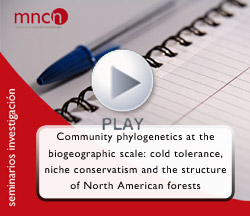Community phylogenetics at the biogeographic scale: cold tolerance niche conservatism and the structure of North American forests. Richard Field Baker Associate Professor of Biogeography at the University of Nottingham UK
Título: Community phylogenetics at the biogeographic scale: cold tolerance, niche conservatism and the structure of North American forests
Ponente: Richard Field Baker, Associate Professor of Biogeography at the University of Nottingham, UK
The tropical conservatism hypothesis, founded on a limited ability of woody clades to adapt to mid-Tertiary global cooling, is a prominent explanation for major global biogeographic patterns. Focusing on the phylogenetic structure of the tree species recorded in 91,340 forest plots (each 0.4 ha) across the contiguous United States, we derived four predictions from this hypothesis: (1) local tree communities to the south are composed of species from older families than communities to the north; (2) the phylogenetic structures of cold tolerance and associated tree traits conform to expectations for trait evolution under a niche-conservatism constraint; (3) cold tolerance is the trait most strongly associated spatially with average clade age; and (4) of 11 environmental variables structured at either broad or local scales, minimum temperature in the coldest month best describes variation in mean family age. Mean family age showed a strong latitudinal pattern consistent with prediction 1, with some regional longitudinal and local patterning superimposed on the main latitudinal trend. Using phylogenetic signal representation curves and pGLS, the cold tolerance trait data were consistent with a niche conservatism interpretation of trait evolution under an Ornstein-Uhlenbeck process, supporting prediction 2. Using Random Forest classification and regression trees and spatial GLMs, our results were also consistent with predictions 3 and 4, accounting for 71% of the variation and all significant spatial structure in the data. We conclude that tropical niche conservatism in the face of long-term climate change may drive local community phylogenetic structure of forests across the US, though some modification of leading hypotheses may be required.
Richard Field's main interests are biogeography, conservation, macroecology and plant ecology, with particular focus on biodiversity and the forces that structure ecological communities. Current projects include the modelling and prediction of patterns of species richness, particularly of trees in southern Africa, Kenya and globally; conservation and biodiversity research in the tropical forests of Hondura; and island biogeography and community structure on Krakatau, Indonesia.
Seminario disponible en Cienciatk






